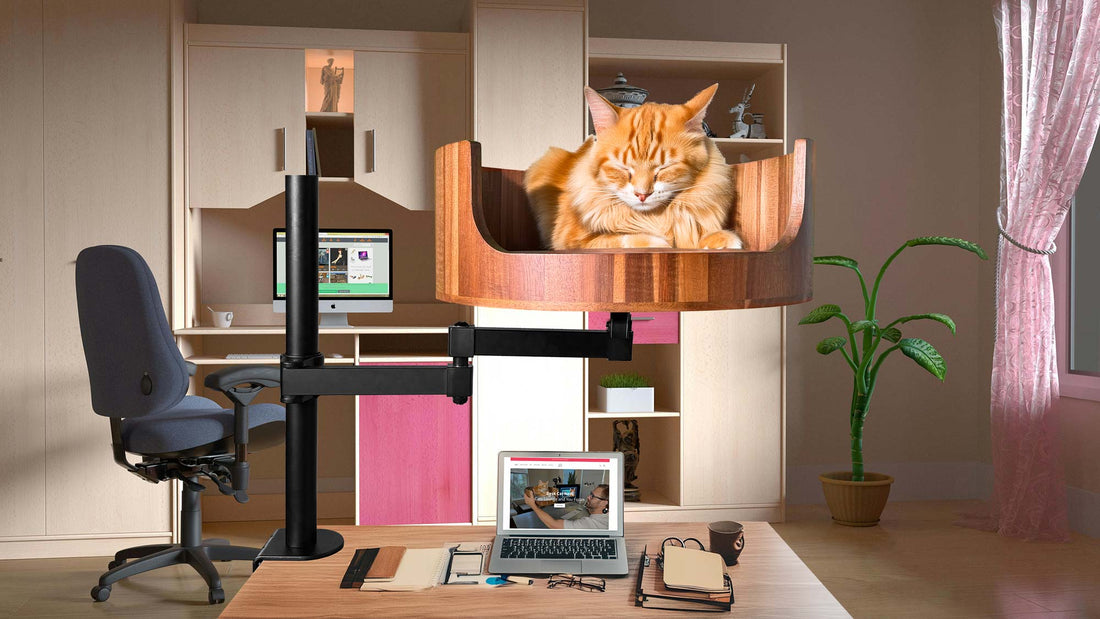
Why Does My Cat Tail Vibrate? Understanding Feline Behavior
Share
Have you ever noticed your cat's tail vibrating or twitching uncontrollably? It may seem strange or even concerning, but it's actually a common feline behavior that can tell you a lot about your furry friend's state of mind. In this article, we will delve into the fascinating world of cat tail vibrations, exploring the reasons behind this behavior and what it can reveal about your cat's emotions and well-being.
Understanding why your cat's tail vibrates is an important part of decoding their body language and building a stronger bond with your pet. From playful excitement to fear or anxiety, a cat's tail can serve as a window into their inner thoughts and feelings. By learning to interpret these subtle signals, you can better meet your cat's needs and provide a safe and comfortable environment for them to thrive in. So, next time you see your cat's tail vibrating, don't panic – instead, take the time to observe their body language and consider what they may be trying to communicate to you.
1. A vibrating tail in cats can indicate a range of emotions including excitement, fear, or aggression.
2. Understanding your cat's body language, such as tail movements, can help you better communicate with your feline friend.
3. Tail vibrations can be a form of communication between cats or between a cat and its human companion.
4. Cats may also exhibit tail quivering when they are feeling tense or unsure in a situation.
5. It is important to observe your cat's overall body language and context to accurately interpret the meaning behind their tail vibrations.
## What is Cat Tail Vibration?
Cat tail vibration is a common behavior exhibited by many cats, and it can have various meanings depending on the context. In most cases, a vibrating tail indicates excitement, arousal, or agitation in a cat. It is important to pay attention to other accompanying body language and vocalizations to interpret the cause of the tail vibration accurately. Understanding why cats vibrate their tails can help cat owners better communicate and bond with their feline companions.
## Reasons for Cat Tail Vibration
There are several reasons why a cat's tail may vibrate. One common cause is when a cat is feeling playful and excited, such as during playtime with their human or another feline friend. Tail vibration can also occur when a cat is feeling anxious, stressed, or threatened. In such cases, the vibration may be more rapid and pronounced, signaling the cat's heightened emotional state. Additionally, some cats may vibrate their tails when they are hunting or stalking prey, mimicking the movements of a snake to confuse and capture their target.
## How to Respond to Cat Tail Vibration
When a cat's tail vibrates, it is essential for cat owners to observe their cat's overall body language and behavior to determine the underlying cause. If a cat's tail is vibrating due to excitement or playfulness, engaging in interactive play with the cat can help release their energy and prevent any potential aggression. On the other hand, if a cat's tail vibration is a result of fear or anxiety, providing a quiet and safe environment for the cat to relax and decompress is crucial. It is also essential to avoid punishing or scolding a cat for tail vibration, as this can escalate their stress and worsen the situation.
## Seeking Professional Help
In some cases, persistent or excessive tail vibration in cats may be a sign of an underlying medical condition or behavioral issue that requires professional intervention. If a cat's tail vibration is accompanied by other concerning symptoms such as aggression, lethargy, or changes in appetite, it is important to consult a veterinarian or animal behaviorist for further evaluation and treatment. These experts can help identify the root cause of the tail vibration and develop a customized plan to address the cat's needs and improve their overall well-being.
Desk Cat Nest FAQ
Why does my cat's tail vibrate?
There are several reasons why your cat's tail may be vibrating. One common reason is that your cat is feeling excited or happy. Cats often vibrate their tails to show their enthusiasm or anticipation. Another reason could be that your cat is feeling anxious or stressed. In this case, the vibrating tail could be a way for your cat to release tension or communicate their discomfort.
Is a vibrating tail a cause for concern?
In most cases, a vibrating tail is not a cause for concern. It is a natural behavior for cats to use their tails to express their emotions. However, if you notice that your cat's tail is constantly vibrating or if it is accompanied by other signs of distress, such as aggression or hiding, it may be worth consulting with a veterinarian to rule out any underlying health issues.
How can Desk Cat Nest help with my cat's vibrating tail?
Desk Cat Nest provides a cozy and comfortable space for your cat to relax and unwind. By providing your cat with a designated resting spot, you can help reduce their stress and anxiety, which may help alleviate the need for tail vibrating. Additionally, the elevated design of Desk Cat Nest can give your cat a sense of security and allow them to observe their surroundings, promoting a sense of calmness.
In conclusion, providing your cat with a comfortable and stress-free environment such as the Desk Cat Bed can help alleviate the reasons why your cat's tail may be vibrating. This unique cat bed is designed to promote relaxation, reduce stress, and provide a cozy space for your feline friend to rest comfortably. By investing in a Desk Cat Bed, you are not only addressing your cat's needs for a peaceful space but also promoting their overall well-being. Give your cat the gift of a soothing retreat with the Desk Cat Bed, and help prevent unwanted vibrations in their tail.



















































